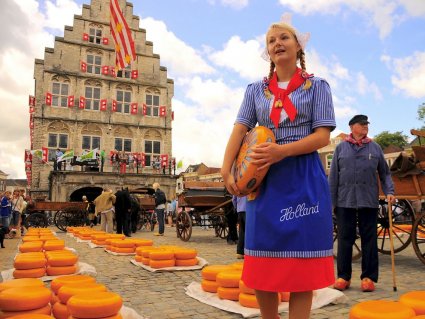Netherlands
Research has shown that international students choose the Netherlands because of the academic quality and the cosmopolitan atmosphere. By the same token, Dutch higher education institutions value the presence of international staff and students because they contribute to an international classroom environment and a more ambitious culture. This has often been seen to have positive effects on the study behaviour of Dutch students.
Higher education in Holland has a worldwide reputation for its high quality. This quality is guaranteed through a national system of regulation and quality assurance. Dutch law (the Higher Education and Research Act) states that degree programmes offered by higher education institutions must be evaluated against a specific set of criteria, assessing the content and the level of the course.
Bachelor’s and master’s programmes that meet the criteria are accredited (i.e. officially recognised) by the Accreditation Organization of the Netherlands and Flanders (NVAO). You will be awarded a recognised degree only after completing an accredited degree programme. This accreditation system was set up to guarantee that higher education programmes in Holland meet the highest standards.
PhD programmes are not accredited by the NVAO: they are the responsibility of individual education institutions. This also applies to programmes and courses leading to a certificate or a diploma, which includes specialised courses.
The quality of specialised courses that are part of an accredited master’s programme is assured through the accreditation of the main programme. The quality of other types of courses is the responsibility of the institutions themselves.
The fact that a course has not been accredited does not mean that it does not meet quality criteria.
Institutions may also offer bachelor’s, master’s or other programmes that have been accredited in another country. In these cases, the degree may be recognised in that country, but not necessarily in Holland. An example would be a master’s programme offered by a Dutch university of applied sciences that has been validated by an accredited British university that awards the degree.
Studies in the Netherlands:
Universities:
Pathways to Universities in Holland (Netherlands), Amsterdam and Groningen
Delft University of Technology (Delft)
Eindhoven University of Technology (Eindhoven)
University of Twente (Enschede)
For more information, please contact StudyWesternEurope EU <- click for e-mail


High quality education in an international setting
Higher education in Holland is known for its high quality and its international study environment. With more than 1,700 international study programmes and courses, it has the largest offer of English-taught programmes in continental Europe.
Binary system
Dutch higher education has a binary system, which means that you can choose between two types of education:
- research-oriented education, offered by research universities;
- higher professional education, offered by universities of applied sciences.
At a research university you will focus more on research-oriented work, which could be either in an academic or in a professional setting. At a university of applied sciences you can choose a professional programme in the applied arts and sciences, to prepare you for a specific career.
A third, smaller branch of higher education is provided by institutes for international education, which offer programmes designed especially for international students.
Three cycles
In 2002 Holland introduced the bachelor’s-master’s degree structure, but the distinction between the two types of education still exists. Both research universities and universities of applied sciences can award a bachelor's or a master's degree.
You first obtain a bachelor’s degree (first cycle), you can then continue to study for a master’s degree (second cycle). After completion of a master’s programme you can start a PhD degree programme (third cycle).
Internship
Many students do an internship as part of their study programme. As a foreign student, you may also be interested in doing an internship in the Netherlands.
Requirements for access to higher education
For access to research-oriented bachelor’s programmes, students are required to have a vwo diploma or to have completed the first year (60 credits) of a bachelor’s programme at a university of applied sciences.
The minimum access requirement to universities of applied sciences is either a havo diploma or a diploma of secondary vocational education (mbo), provided certain conditions are met. The vwo diploma also grants access to universities of applied sciences. For access to both types of higher education, pupils are required to have completed at least one of the subject clusters that fulfil the requirements for the higher education programme in question.
A quota, or numerus fixus, applies for access to certain programmes, primarily in the medical sciences, and places are allocated mainly using a weighted lottery.
Potential students older than 21 years who do not possess one of the qualifications mentioned above can qualify for access to higher education on the basis of an entrance examination and assessment (recognition of prior learning). For access to certain programmes, particularly those in the fine arts, students have to demonstrate the required artistic abilities. The only access requirement for the Open University is that applicants be at least eighteen years of age.
For access to all master’s programmes, a bachelor’s degree in one or more specific disciplines is required, in some cases in combination with other requirements. Graduates with a bachelor’s degree in the applied arts and sciences usually have to fulfil additional requirements for access to a research-oriented master’s programme
















